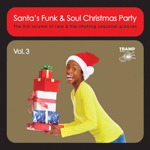 As much as I'm a sucker for old-school soul records, you'd think I would have known about this series of albums based on flea-market rescues of seriously obscure soul Christmas records before this. So I'm indebted to friend of the site Sean Delany, who broke his skein of painstakingly compiled and art-directed holiday mix discs in 2015 because he was busy curating this third collection in the series for Tramp Records. Sean's detailed liner notes indicate that at least some of these records were vanity releases, on a level with all those indie punk rock singles that never got beyond 1,000 copies and were probably only heard regionally in their day. Cleveland Robinson's "Xmas Time Is Here Again," for example, was released on Nosnibor Records, and you don't need to be a fan of word games to work out how the label got its name. Despite the low-budget origins of these songs and the herculean effort to make decent quality reproductions of these ancient vinyl artifacts, there's enthusiasm and spirit in all these recordings. My favorites are "Dear Santa" by Syng McGowan & the Fanettes, "Sock It To 'Em Santa" by Joe Shinall, "Happy Birthday Jesus" by Sam Sweetsinger Bell, the smoking instrumental "Santa Soul" by Rocki Lane and The Gross Group, the synth-bass-led funk workouts "Black (Soul) Christmas" by Timi Terrific & the Redheads and "Disco Claus" by The Bionic I, and the almost garage-soul "Santa's New Bag" by Rudi and the Rain Dearz. Definitely the best historical collection I've encountered this year, even if the Grammy Award voters haven't seen fit to nominate it.
As much as I'm a sucker for old-school soul records, you'd think I would have known about this series of albums based on flea-market rescues of seriously obscure soul Christmas records before this. So I'm indebted to friend of the site Sean Delany, who broke his skein of painstakingly compiled and art-directed holiday mix discs in 2015 because he was busy curating this third collection in the series for Tramp Records. Sean's detailed liner notes indicate that at least some of these records were vanity releases, on a level with all those indie punk rock singles that never got beyond 1,000 copies and were probably only heard regionally in their day. Cleveland Robinson's "Xmas Time Is Here Again," for example, was released on Nosnibor Records, and you don't need to be a fan of word games to work out how the label got its name. Despite the low-budget origins of these songs and the herculean effort to make decent quality reproductions of these ancient vinyl artifacts, there's enthusiasm and spirit in all these recordings. My favorites are "Dear Santa" by Syng McGowan & the Fanettes, "Sock It To 'Em Santa" by Joe Shinall, "Happy Birthday Jesus" by Sam Sweetsinger Bell, the smoking instrumental "Santa Soul" by Rocki Lane and The Gross Group, the synth-bass-led funk workouts "Black (Soul) Christmas" by Timi Terrific & the Redheads and "Disco Claus" by The Bionic I, and the almost garage-soul "Santa's New Bag" by Rudi and the Rain Dearz. Definitely the best historical collection I've encountered this year, even if the Grammy Award voters haven't seen fit to nominate it. Recently in 1960s Category
 As much as I'm a sucker for old-school soul records, you'd think I would have known about this series of albums based on flea-market rescues of seriously obscure soul Christmas records before this. So I'm indebted to friend of the site Sean Delany, who broke his skein of painstakingly compiled and art-directed holiday mix discs in 2015 because he was busy curating this third collection in the series for Tramp Records. Sean's detailed liner notes indicate that at least some of these records were vanity releases, on a level with all those indie punk rock singles that never got beyond 1,000 copies and were probably only heard regionally in their day. Cleveland Robinson's "Xmas Time Is Here Again," for example, was released on Nosnibor Records, and you don't need to be a fan of word games to work out how the label got its name. Despite the low-budget origins of these songs and the herculean effort to make decent quality reproductions of these ancient vinyl artifacts, there's enthusiasm and spirit in all these recordings. My favorites are "Dear Santa" by Syng McGowan & the Fanettes, "Sock It To 'Em Santa" by Joe Shinall, "Happy Birthday Jesus" by Sam Sweetsinger Bell, the smoking instrumental "Santa Soul" by Rocki Lane and The Gross Group, the synth-bass-led funk workouts "Black (Soul) Christmas" by Timi Terrific & the Redheads and "Disco Claus" by The Bionic I, and the almost garage-soul "Santa's New Bag" by Rudi and the Rain Dearz. Definitely the best historical collection I've encountered this year, even if the Grammy Award voters haven't seen fit to nominate it.
As much as I'm a sucker for old-school soul records, you'd think I would have known about this series of albums based on flea-market rescues of seriously obscure soul Christmas records before this. So I'm indebted to friend of the site Sean Delany, who broke his skein of painstakingly compiled and art-directed holiday mix discs in 2015 because he was busy curating this third collection in the series for Tramp Records. Sean's detailed liner notes indicate that at least some of these records were vanity releases, on a level with all those indie punk rock singles that never got beyond 1,000 copies and were probably only heard regionally in their day. Cleveland Robinson's "Xmas Time Is Here Again," for example, was released on Nosnibor Records, and you don't need to be a fan of word games to work out how the label got its name. Despite the low-budget origins of these songs and the herculean effort to make decent quality reproductions of these ancient vinyl artifacts, there's enthusiasm and spirit in all these recordings. My favorites are "Dear Santa" by Syng McGowan & the Fanettes, "Sock It To 'Em Santa" by Joe Shinall, "Happy Birthday Jesus" by Sam Sweetsinger Bell, the smoking instrumental "Santa Soul" by Rocki Lane and The Gross Group, the synth-bass-led funk workouts "Black (Soul) Christmas" by Timi Terrific & the Redheads and "Disco Claus" by The Bionic I, and the almost garage-soul "Santa's New Bag" by Rudi and the Rain Dearz. Definitely the best historical collection I've encountered this year, even if the Grammy Award voters haven't seen fit to nominate it. 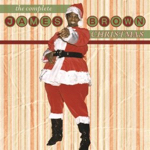
This 2010 two-disc collection of James Brown's 1960s holiday music released on King Records is the perfect historical document for the Godfather's classic Christmas sides, three albums and a couple of non-LP singles, plus single versions of album cuts. (CD's are out of print, but a full download remains available. You can distill all of this into a single-disc collection, James Brown's Funky Christmas. Also, word has it that the original albums will be out on vinyl for the 2015 holidays.) The first album was 1966's James Brown and His Famous Flames Sing Christmas Songs, with James credited as co-writer on the majority of songs, including "Let's Make Christmas Mean Something This Year," "Sweet Little Baby Boy (Parts 1 & 2)," "This Is My Lonely Christmas (Parts 1 & 2)," "Signs of Christmas" and "Merry Christmas I Love You." James also did two versions of "The Christmas Song (Chestnuts)," "Please Come Home For Christmas," Billy Ward's "Christmas In Heaven" and "Merry Christmas Baby." In 1968 A Soulful Christmas introduced James' all-time classic "Santa Claus Go Straight To the Ghetto" and also featured the title song, "Santa Claus Santa Claus," "Santa Claus Gave Me a Brand New Start," "Christmas Is Coming," "Let's Unite the Whole World at Christmas," "Tit For Tat (Ain't No Taking Back,)" and the instrumentals "In the Middle," "You Know It," and "Believers Shall Enjoy (Non Believers Shall Suffer)." Oddly, "Say It Loud (I'm Black and I'm Proud)" was on this album as well. The third album, 1970's Hey America, was written almost entirely by Brown associate Nat Jones, and the title song was a kind of holiday-themed protest number with an almost rock-styled rhythm. Also here are the ballads "Merry Christmas My Baby and a Very Happy New Year," "A Lonely Little Boy Around One Christmas Toy" and "Santa Claus Is Defiinitely Here To Stay," the driving "Go Power At Christmas Time," the funk-styled "Christmas Is Love," and the oddity "My Rapp," a letter to an estranged lover. For 1969 James released a single, "It's Christmas Time (Parts 1 & 2)," a ballad on which James also played organ, and the other singles included here were alternate versions of album cuts. The title of this complete album is misleading, however, as James released Merry Christmas Album in 1999, with 11 more songs, none repeated from the past.
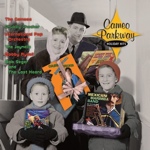 This one's for the old folks out there, a collection of early to mid-1960s Christmas records from the Cameo Parkway family of labels, collected for re-release in 2011. It's also more for the folks who like Christmas music in all styles, since half the album is straight-up orchestral instrumental pop versions of famous songs and carols by the Rudolph Statler Orchestra and the International Pop Orchestra. Two versions of "Auld Lang Syne" are banjo-led instrumentals, by bluegrass band Bob Johnson and the Lonesome Travelers and pianist Beethoven Ben. And the "Twelve Days of Christmas" get a Mexico-via-the-Copacabana version by the Mexicani Marimba Band. Here's what remains. Both sides of a 1961 Bobby Rydell/Chubby Checker duet single, a cover of "Jingle Bell Rock" backed with "Jingle Bell Imitations," the latter featuring the two doing impressions of Elvis Presley, Bobby Darin, Fats Domino, Frank Fontaine, and the Chipmunks (!) singing "Jingle Bells." Then there's both sides of a 1957 single by the Cameos, "Merry Christmas" and "New Years Eve," a pair of doo-wop classics and the only non-60s performances on the album. Speaking of the end of the year, we also have a doo-wop ballad by The Jaynells from 1963, "I'll Stay Home (New Year's Eve)." "White Christmas (3 O'Clock Westher Report)" by Bobby the Poet is a 1967 novelty record with an impression of Bob Dylan singing the popular Christmas tune, also featuring a Bobby Kennedy imitator adding commentary and topped off with a reading of the weather report, in the fashion of Simon & Garfunkel's "7 O'Clock News/Silent Night." Yeah, there's a lot going on there. Toni Stante gives a girl-group arrangement to a 1965 performance of "Donde Esta Santa Claus." And finally, Bob Seger & the Last Heard, from 1966, give us the Mistletunes classic "Sock It To Me Santa." A spotty collection if you're a rock specialist, but this one's for the archivists among us.
This one's for the old folks out there, a collection of early to mid-1960s Christmas records from the Cameo Parkway family of labels, collected for re-release in 2011. It's also more for the folks who like Christmas music in all styles, since half the album is straight-up orchestral instrumental pop versions of famous songs and carols by the Rudolph Statler Orchestra and the International Pop Orchestra. Two versions of "Auld Lang Syne" are banjo-led instrumentals, by bluegrass band Bob Johnson and the Lonesome Travelers and pianist Beethoven Ben. And the "Twelve Days of Christmas" get a Mexico-via-the-Copacabana version by the Mexicani Marimba Band. Here's what remains. Both sides of a 1961 Bobby Rydell/Chubby Checker duet single, a cover of "Jingle Bell Rock" backed with "Jingle Bell Imitations," the latter featuring the two doing impressions of Elvis Presley, Bobby Darin, Fats Domino, Frank Fontaine, and the Chipmunks (!) singing "Jingle Bells." Then there's both sides of a 1957 single by the Cameos, "Merry Christmas" and "New Years Eve," a pair of doo-wop classics and the only non-60s performances on the album. Speaking of the end of the year, we also have a doo-wop ballad by The Jaynells from 1963, "I'll Stay Home (New Year's Eve)." "White Christmas (3 O'Clock Westher Report)" by Bobby the Poet is a 1967 novelty record with an impression of Bob Dylan singing the popular Christmas tune, also featuring a Bobby Kennedy imitator adding commentary and topped off with a reading of the weather report, in the fashion of Simon & Garfunkel's "7 O'Clock News/Silent Night." Yeah, there's a lot going on there. Toni Stante gives a girl-group arrangement to a 1965 performance of "Donde Esta Santa Claus." And finally, Bob Seger & the Last Heard, from 1966, give us the Mistletunes classic "Sock It To Me Santa." A spotty collection if you're a rock specialist, but this one's for the archivists among us.
Once again we hit the target date of the season, or we will in a few hours from when I'm typing this, anyway. Merry Christmas and happy holidays to Mistletunes' readers, correspondents, friends and relatives everywhere. Hope you're turning up the stereo, or the earbuds, the better to enjoy a rockin' holiday. Keep coming back, though, 'cause I'm planning to keep posting throughout the year (just not on Christmas day). Take it away, Huey "Piano" Smith and the Clowns....
 I'm including this more for historical purposes, though some of us are big on authenticity as well. The Staples were always first and foremost a gospel group, but most of us recall them for their secular hits like "I'll Take You There." Similarly, their best-known Christmas tune among us pop-rock Christmas fans would be "Who Took the Merry Out of Christmas," a more secular tune that isn't on this 1962 collection. This is a straight gospel workout featuring songs mainly taken from the gospel repertoire like the title song, "Go Tell It on the Mountain," "Sweet Little Jesus Boy," "No Room at the Inn" and so on. A few more popular carols like "Joy to the World," "Silent Night, and "O Little Town of Bethlehem," songs that emphasize the religious aspect, are also here. Notable for making its CD debut in 2007, and also because at least some of our readers are interested in the roots of our obsession with popular Christmas music. UPDATE: Bob Bailey notes that this album was on CD before, in 1993, as A Gospel Christmas Card, but with several additional tracks by other gospel artists added.
I'm including this more for historical purposes, though some of us are big on authenticity as well. The Staples were always first and foremost a gospel group, but most of us recall them for their secular hits like "I'll Take You There." Similarly, their best-known Christmas tune among us pop-rock Christmas fans would be "Who Took the Merry Out of Christmas," a more secular tune that isn't on this 1962 collection. This is a straight gospel workout featuring songs mainly taken from the gospel repertoire like the title song, "Go Tell It on the Mountain," "Sweet Little Jesus Boy," "No Room at the Inn" and so on. A few more popular carols like "Joy to the World," "Silent Night, and "O Little Town of Bethlehem," songs that emphasize the religious aspect, are also here. Notable for making its CD debut in 2007, and also because at least some of our readers are interested in the roots of our obsession with popular Christmas music. UPDATE: Bob Bailey notes that this album was on CD before, in 1993, as A Gospel Christmas Card, but with several additional tracks by other gospel artists added.
 The superstars of the Motown stable, recognizable not only in the 60s variation of the "hood" but on Main Street as well, nursed along a secret affinity for schlock and schmaltz during their whole existence. Remember such albums as The Supremes Sing Rogers and Hart? Remember their single of "The Happening?" You can therefore guess how this 1965 holiday album turned out -- sappy. Although all the Motown Christmas albums exhibit a certain amount of excessive wholesomeness, you'd never guess this album had anything at all to do with Motown if you heard it in a vacuum. Liner notes of the 1999 reissue make it clear this is Berry Gordy's fault, as he was obsessed with "crossing over" from a black audience to a general audience and felt the Supremes had the best chance of doing so. I'm guessing the notion that "My Favorite Things" was a Christmas song started with this album, "Twinkle Twinkle Little Me" is the fabled star singing about itself (gag), the "Children's Christmas Song" works in the mandatory kid-singing number (the last two songs were actually a single back in the day) and the rest is mostly failed nightclubbery, 60s style. Only "Little Bright Star" and "Santa Claus Is Coming To Town" incorporate much of the Motown sound. Collectors will note the reissue adds four bonus cuts, including an unreleased "Noel" and a remix of Florence Ballard taking the only lead on the album away from Diana Ross on "Silent Night." Update: Re-released in 2004 as part of the Christmas Collection: 20th Century Masters series.
The superstars of the Motown stable, recognizable not only in the 60s variation of the "hood" but on Main Street as well, nursed along a secret affinity for schlock and schmaltz during their whole existence. Remember such albums as The Supremes Sing Rogers and Hart? Remember their single of "The Happening?" You can therefore guess how this 1965 holiday album turned out -- sappy. Although all the Motown Christmas albums exhibit a certain amount of excessive wholesomeness, you'd never guess this album had anything at all to do with Motown if you heard it in a vacuum. Liner notes of the 1999 reissue make it clear this is Berry Gordy's fault, as he was obsessed with "crossing over" from a black audience to a general audience and felt the Supremes had the best chance of doing so. I'm guessing the notion that "My Favorite Things" was a Christmas song started with this album, "Twinkle Twinkle Little Me" is the fabled star singing about itself (gag), the "Children's Christmas Song" works in the mandatory kid-singing number (the last two songs were actually a single back in the day) and the rest is mostly failed nightclubbery, 60s style. Only "Little Bright Star" and "Santa Claus Is Coming To Town" incorporate much of the Motown sound. Collectors will note the reissue adds four bonus cuts, including an unreleased "Noel" and a remix of Florence Ballard taking the only lead on the album away from Diana Ross on "Silent Night." Update: Re-released in 2004 as part of the Christmas Collection: 20th Century Masters series.
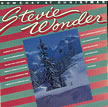 This album was originally released for Christmas 1967, which means Stevie was still 16 and still taking orders from Berry Gordy as to what and when to record. Which explains why this album has more in common with the other Motown holiday albums than it does with Stevie's later, history-making work. It's a full-orchestra pop album for the most part, pretty sappy across the board, with "Andy Willams Christmas Special" styled versions of "Silver Bells," "Ave Maria, "The Christmas Song," "The Little Drummer Boy," and so on. There are some originals from Motown's staff writers, the nadir of which is "Twinkle Twinkle Little Me," which was bad enough on the Supremes' album without making Stevie do it too. Of course, as long as Stevie's singing, how bad can this album be, right? Fortunately, this album contributes to the canon "What Christmas Means to Me," the only straight-up Motown-style tune on the album and enough to justify the rest, although I wouldn't mind hearing a more muscular version of "One Little Christmas Tree" sometime from someone, too. The title song is rendered in a fairly middle-of-the-road arrangement, but it's a good holiday tune anyway. UPDATE: The 20th Century Masters edition of this album released in 2004 adds two additional cuts, "The Miracles of Christmas" and "Everyone's a Kid at Christmas Time."
This album was originally released for Christmas 1967, which means Stevie was still 16 and still taking orders from Berry Gordy as to what and when to record. Which explains why this album has more in common with the other Motown holiday albums than it does with Stevie's later, history-making work. It's a full-orchestra pop album for the most part, pretty sappy across the board, with "Andy Willams Christmas Special" styled versions of "Silver Bells," "Ave Maria, "The Christmas Song," "The Little Drummer Boy," and so on. There are some originals from Motown's staff writers, the nadir of which is "Twinkle Twinkle Little Me," which was bad enough on the Supremes' album without making Stevie do it too. Of course, as long as Stevie's singing, how bad can this album be, right? Fortunately, this album contributes to the canon "What Christmas Means to Me," the only straight-up Motown-style tune on the album and enough to justify the rest, although I wouldn't mind hearing a more muscular version of "One Little Christmas Tree" sometime from someone, too. The title song is rendered in a fairly middle-of-the-road arrangement, but it's a good holiday tune anyway. UPDATE: The 20th Century Masters edition of this album released in 2004 adds two additional cuts, "The Miracles of Christmas" and "Everyone's a Kid at Christmas Time."
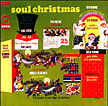 An early collection compiled in 1968 by Atlantic Records from singles and Christmas albums recorded by its R&B roster, including the folks from Stax Records, which was distributed by Atlantic at the time. Most of the tunes are covers, Otis Redding being Otis on "White Christmas" and "Merry Christmas Baby," Booker T. and the MGs ringing out with "Silver Bells" and "Jingle Bells," King Curtis wailing on "The Christmas Song" and "What Are You Doing New Year's Eve." But there are some originals, like Solomon Burke doing "Presents For Christmas," William Bell with "Every Day Will Be Like a Holiday," Clarence Carter with "Back Door Santa," Joe Tex promising "I'll Make Every Day Christmas (For My Woman)" and Carla Thomas reprising her hit "Gee Whiz" as "Gee Whiz, It's Christmas." A top-notch collection. In recent years, it's been reissued in its original version on CD and in an extended version by Rhino Records, adding several cuts including Luther Vandross with "May Christmas Bring You Happiness" and The Drifters' version of "The Christmas Song."
An early collection compiled in 1968 by Atlantic Records from singles and Christmas albums recorded by its R&B roster, including the folks from Stax Records, which was distributed by Atlantic at the time. Most of the tunes are covers, Otis Redding being Otis on "White Christmas" and "Merry Christmas Baby," Booker T. and the MGs ringing out with "Silver Bells" and "Jingle Bells," King Curtis wailing on "The Christmas Song" and "What Are You Doing New Year's Eve." But there are some originals, like Solomon Burke doing "Presents For Christmas," William Bell with "Every Day Will Be Like a Holiday," Clarence Carter with "Back Door Santa," Joe Tex promising "I'll Make Every Day Christmas (For My Woman)" and Carla Thomas reprising her hit "Gee Whiz" as "Gee Whiz, It's Christmas." A top-notch collection. In recent years, it's been reissued in its original version on CD and in an extended version by Rhino Records, adding several cuts including Luther Vandross with "May Christmas Bring You Happiness" and The Drifters' version of "The Christmas Song."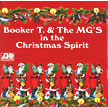 Originally released for Christmas 1966, this is what the holiday sounds like when it's accompanied by one of rock and soul's most accomplished backup bands. Besides playing behind many of the Stax/Watt hits by Otis Redding, Sam & Dave and so many others, they had their own instrumental Top 40 hits like "Hip-Hug Her," a cover of the Rascals' "Groovin'," and "Green Onions." And of course, various members turned up in the Blues Brothers backing band over time. In the modern day this may sound tame, but it's all of a piece with the band's other recordings. Notice the bluesy playout on "White Christmas," the guitar that kicks it up a notch on "Jingle Bells," the slinky groove of "Silver Bells," and so on. The medley of "We Three Kings" with an unlisted "O Come All Ye Faithful" seems to go on forever, but it's followed by the funky album closer "We Wish You a Merry Christmas." One of the era's classics.
Originally released for Christmas 1966, this is what the holiday sounds like when it's accompanied by one of rock and soul's most accomplished backup bands. Besides playing behind many of the Stax/Watt hits by Otis Redding, Sam & Dave and so many others, they had their own instrumental Top 40 hits like "Hip-Hug Her," a cover of the Rascals' "Groovin'," and "Green Onions." And of course, various members turned up in the Blues Brothers backing band over time. In the modern day this may sound tame, but it's all of a piece with the band's other recordings. Notice the bluesy playout on "White Christmas," the guitar that kicks it up a notch on "Jingle Bells," the slinky groove of "Silver Bells," and so on. The medley of "We Three Kings" with an unlisted "O Come All Ye Faithful" seems to go on forever, but it's followed by the funky album closer "We Wish You a Merry Christmas." One of the era's classics.
 Record labels specializing in black artists felt a bit left out of the Summer of Love, since it was mainly white artists creating the new "psychedelic" sound. Cadet/Concept, part of the Chess family, thought they had just the thing for the times with Rotary Connection, a multi-racial rock/soul outfit featuring the late Minnie Ripperton, that recorded three albums for the label before breaking up. One of those three albums was this one, a 1968 hippy-dippy concept album for Christmas that, well, has its moments of good music, but those are far outweighed by the dated peace 'n love posturing. Minnie sings mostly backup, stepping out only on "Christmas Love," probably the best song here. Soundwise, imagine The Fifth Dimension if they hung out at the Grateful Dead's house. The psychedelic "Silent Night" that is the second cut on the album is reprised two more times; the last one is followed by a cut called "Silence," which is, in best John Cage fashion, 90 seconds of silence. That probably tells you as much about this album as you need to know. Here's a fan-made video of "Christmas Love":
Record labels specializing in black artists felt a bit left out of the Summer of Love, since it was mainly white artists creating the new "psychedelic" sound. Cadet/Concept, part of the Chess family, thought they had just the thing for the times with Rotary Connection, a multi-racial rock/soul outfit featuring the late Minnie Ripperton, that recorded three albums for the label before breaking up. One of those three albums was this one, a 1968 hippy-dippy concept album for Christmas that, well, has its moments of good music, but those are far outweighed by the dated peace 'n love posturing. Minnie sings mostly backup, stepping out only on "Christmas Love," probably the best song here. Soundwise, imagine The Fifth Dimension if they hung out at the Grateful Dead's house. The psychedelic "Silent Night" that is the second cut on the album is reprised two more times; the last one is followed by a cut called "Silence," which is, in best John Cage fashion, 90 seconds of silence. That probably tells you as much about this album as you need to know. Here's a fan-made video of "Christmas Love":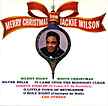 One of the greats in rock music history, Jackie's Christmas album from 1963 unfortunately is an aberration in his sterling track record of soulful hits. I don't know whether this is because some producer or record executive thought they were doing him a favor by getting him to record such a MOR album, or whether Jackie himself wasn't up to rocking the season. Nevertheless, we are faced with a dozen Christmas standards done in arrangements that would have better suited Andy Williams or Perry Como. Jackie does inject some of his personal style into the vocals, so fans can't miss him, but this doesn't rock out in any meaningful fashion. The original vinyl is probably highly collectible, and for that matter Rhino's 1991 CD reissue (shown above) probably is too, as neither are in print. But there's a reissue of this out on Brunswick with the original cover art.
One of the greats in rock music history, Jackie's Christmas album from 1963 unfortunately is an aberration in his sterling track record of soulful hits. I don't know whether this is because some producer or record executive thought they were doing him a favor by getting him to record such a MOR album, or whether Jackie himself wasn't up to rocking the season. Nevertheless, we are faced with a dozen Christmas standards done in arrangements that would have better suited Andy Williams or Perry Como. Jackie does inject some of his personal style into the vocals, so fans can't miss him, but this doesn't rock out in any meaningful fashion. The original vinyl is probably highly collectible, and for that matter Rhino's 1991 CD reissue (shown above) probably is too, as neither are in print. But there's a reissue of this out on Brunswick with the original cover art.
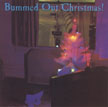 Another of the great Rhino Christmas compilations, this one tracks the dark side of the holiday. Look at the titles: "Christmas in Jail," "Christmas Spirit??" and "Don't Believe in Christmas" (those two comprising the single from the Wailers and Sonics album mentioned elsewhere), "Santa Got a DWI," and this obscure Everly Brothers classic, "Christmas Eve Can Kill You." There's also "Christmas in Viet Nam" and the Staples Singers demanding to know "Who Took the Merry Out of Christmas?" Possibly the apex of this collection is "Who Say There Ain't No Santa Claus" by Ron Holden and the Thunderbirds, in which the singer starts out by celebrating the big insurance settlement he got from his wife's death and ends up in the chair after being convicted of her murder. Bummed out Christmas, indeed.
Another of the great Rhino Christmas compilations, this one tracks the dark side of the holiday. Look at the titles: "Christmas in Jail," "Christmas Spirit??" and "Don't Believe in Christmas" (those two comprising the single from the Wailers and Sonics album mentioned elsewhere), "Santa Got a DWI," and this obscure Everly Brothers classic, "Christmas Eve Can Kill You." There's also "Christmas in Viet Nam" and the Staples Singers demanding to know "Who Took the Merry Out of Christmas?" Possibly the apex of this collection is "Who Say There Ain't No Santa Claus" by Ron Holden and the Thunderbirds, in which the singer starts out by celebrating the big insurance settlement he got from his wife's death and ends up in the chair after being convicted of her murder. Bummed out Christmas, indeed.
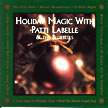 They say success has a thousand fathers while failure is an orphan. That's the story of this album in a nutshell. Patti's a well-known diva (and cook!) nowadays, but she hasn't sounded anything like this in oh, say 40 years -- her style has evolved and, naturally, her voice is a little darker with age. Thrown together on short notice and a tight budget, it's 10 traditional carols and holiday standards with standard mid-1960s arrangements, ponderous and unoriginal, that do nothing to bring out what was fun about that era's girl groups. Unless you're stuck in this particular era, this CD will probably get pretty old a couple of cuts in. It's instructive that I have so far had no success turning up anything about the history of this record, including its original release date. Meanwhile, this orphan will always manage to turn up in somebody's bargain bin at Christmas, thanks to cheap and neglected resale rights. UPDATE: Martin Johns, once again, checks in with some more info. "The Patti LaBelle & Bluebells album was originally released on Newtown Records in 1962 (as Sleigh Bells, Jingle Bells and Blue Bells), retitled and rereleased in 1971 on Trip... and on and on." Patti went on to cut more holiday music as a solo artist, offering This Christmas in 1996 and Miss Patti's Christmas in 2007.
They say success has a thousand fathers while failure is an orphan. That's the story of this album in a nutshell. Patti's a well-known diva (and cook!) nowadays, but she hasn't sounded anything like this in oh, say 40 years -- her style has evolved and, naturally, her voice is a little darker with age. Thrown together on short notice and a tight budget, it's 10 traditional carols and holiday standards with standard mid-1960s arrangements, ponderous and unoriginal, that do nothing to bring out what was fun about that era's girl groups. Unless you're stuck in this particular era, this CD will probably get pretty old a couple of cuts in. It's instructive that I have so far had no success turning up anything about the history of this record, including its original release date. Meanwhile, this orphan will always manage to turn up in somebody's bargain bin at Christmas, thanks to cheap and neglected resale rights. UPDATE: Martin Johns, once again, checks in with some more info. "The Patti LaBelle & Bluebells album was originally released on Newtown Records in 1962 (as Sleigh Bells, Jingle Bells and Blue Bells), retitled and rereleased in 1971 on Trip... and on and on." Patti went on to cut more holiday music as a solo artist, offering This Christmas in 1996 and Miss Patti's Christmas in 2007.
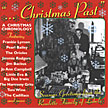 Another troll through the vaults, this one makes a point of noting it got this collection from the back room at the now-defunct Roulette Records. Some of these items are no surprise, as they've turned up on numerous collections. Others are a little more rare. Jim Backus of Mr. Magoo fame and Howard Morris, the once and future Ernest T. Bass, have novelty records here, Backus giving us "Why Don't You Go Home for Christmas," an anti-wife song, and Morris with both sides of his "Department Store Santa Claus" single. The Cadillacs' arrangement of "Rudolph the Red-Nosed Reindeer" is the one the Smithereens adapted for their version, the Marcels' "Merry Twist-Mas" is joined by a less-well known item, "Don't Cry for Me This Christmas," and Pearl Bailey and the Orioles contribute a pair of carols each. Little Eva joins with Big Dee Irwin for "I Wish You a Merry Christmas" and the Harmony Grits -- former members of the original Drifters -- do "Santa Claus is Coming to Town." The liner notes don't shrink from criticism; a Vietnam exploitation record by Derrick Roberts gets the note-writer's raspberry (deserved.) A pretty good collection for the oldies fan, with three New Year's songs, including Jo Ann Campbell's "Happy Happy New Year Baby," based on "Happy Happy Birthday Baby," not to mention "Merry Merry Christmas Baby." UPDATE: Yet another collection out of print and commanding high collector prices at this writing.
Another troll through the vaults, this one makes a point of noting it got this collection from the back room at the now-defunct Roulette Records. Some of these items are no surprise, as they've turned up on numerous collections. Others are a little more rare. Jim Backus of Mr. Magoo fame and Howard Morris, the once and future Ernest T. Bass, have novelty records here, Backus giving us "Why Don't You Go Home for Christmas," an anti-wife song, and Morris with both sides of his "Department Store Santa Claus" single. The Cadillacs' arrangement of "Rudolph the Red-Nosed Reindeer" is the one the Smithereens adapted for their version, the Marcels' "Merry Twist-Mas" is joined by a less-well known item, "Don't Cry for Me This Christmas," and Pearl Bailey and the Orioles contribute a pair of carols each. Little Eva joins with Big Dee Irwin for "I Wish You a Merry Christmas" and the Harmony Grits -- former members of the original Drifters -- do "Santa Claus is Coming to Town." The liner notes don't shrink from criticism; a Vietnam exploitation record by Derrick Roberts gets the note-writer's raspberry (deserved.) A pretty good collection for the oldies fan, with three New Year's songs, including Jo Ann Campbell's "Happy Happy New Year Baby," based on "Happy Happy Birthday Baby," not to mention "Merry Merry Christmas Baby." UPDATE: Yet another collection out of print and commanding high collector prices at this writing.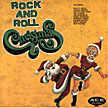 This album is a real puzzlement. I'm guessing it was originally assembled sometime in the 60s, as I've seen vinyl versions of this for years, and it made the transition to CD at some point. It turns out that most -- but not all -- of it is the seminal 1962 Christmas album by Huey "Piano" Smith and the Clowns, still a holiday rocker par excellence. All 10 tunes from that album are on here. There are six others, and I'm hoping someone will be able to fill in the gaps in the ensuing rundown. "Christmas Finds Me Oh So Sad" is definitely Charles Brown, as it was one side of a 1960 single on the associated Teem Records. It's similar to "Please Come Home For Christmas," as it's the same melody and chords but different words. Another version of "Merry Christmas Baby" was the A-side, and the version on here sounds like Brown, but the lyrics are all different and the piano player vamps bits of "Jingle Bells" between verses. (UPDATE: It's him, see below.) "Shimmy Winter Wonderland" by The Swingin' Embers is on here too, a 1961 single. "Rappin' Before Christmas," a great talk-through of the old "Night Before Christmas" story, is by just the Clowns. UPDATE: Brian Zimmerman got hold of the full track list from what he believes is a Japanese import, adding "Weary Silent Night" by Earl King (not on the American copy), "Please Come Home For Christmas" and "A Lonely Christmas" by Bob Wagner and "White Christmas Blue" by Johnny Meyers. UPDATE: A variation of this album is sold as A Southern Christmas. And no version of this album is currently in print, though copies trade fairly expensively when they do turn up.
This album is a real puzzlement. I'm guessing it was originally assembled sometime in the 60s, as I've seen vinyl versions of this for years, and it made the transition to CD at some point. It turns out that most -- but not all -- of it is the seminal 1962 Christmas album by Huey "Piano" Smith and the Clowns, still a holiday rocker par excellence. All 10 tunes from that album are on here. There are six others, and I'm hoping someone will be able to fill in the gaps in the ensuing rundown. "Christmas Finds Me Oh So Sad" is definitely Charles Brown, as it was one side of a 1960 single on the associated Teem Records. It's similar to "Please Come Home For Christmas," as it's the same melody and chords but different words. Another version of "Merry Christmas Baby" was the A-side, and the version on here sounds like Brown, but the lyrics are all different and the piano player vamps bits of "Jingle Bells" between verses. (UPDATE: It's him, see below.) "Shimmy Winter Wonderland" by The Swingin' Embers is on here too, a 1961 single. "Rappin' Before Christmas," a great talk-through of the old "Night Before Christmas" story, is by just the Clowns. UPDATE: Brian Zimmerman got hold of the full track list from what he believes is a Japanese import, adding "Weary Silent Night" by Earl King (not on the American copy), "Please Come Home For Christmas" and "A Lonely Christmas" by Bob Wagner and "White Christmas Blue" by Johnny Meyers. UPDATE: A variation of this album is sold as A Southern Christmas. And no version of this album is currently in print, though copies trade fairly expensively when they do turn up.
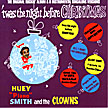 This seminal 1962 album on Ace Records is a serious party-down album of the Christmas variety; you can tell just by listening to their version of "Silent Night," on which most acts do too reverent a job. Ironically, this collector's item stacked up in warehouses on its initial issue in 1962, according to the liner notes, because of the inept distributorship of Vee-Jay Records, a firm that would later go on to fumble its brief ownership of The Beatles. But let's talk about Huey and the Clowns, who grafted bits of their earlier hits onto their holiday performances to ramp up the excitement level. Sounds cheesy, but modern acts might want to trot out that technique once in a while; it's at least good for laughs. The CD reissue includes instrumental-only versions of the tunes, so you can get down all year round! UPDATE: In the course of analyzing the track list for Ace Records' A Rock 'n Roll Christmas, which is an alternate version of this album with additional songs by other artists, Brian Zimmerman discovered there were a fair number of guest artists on this album. The Heartbeats join the Clowns on "Jingle Bells" and "Almost Time for Santa," Jessie Thomas is on "Silent Night," "Doing the Santa Claus," "Twas the Night Before Christmas" and "All I Want for Christmas," and Bubba Anderson is on "Rock 'n Roll Santa Claus." Long out of print, Westside Records reissued the album on CD several years ago, and that too is no longer available.
This seminal 1962 album on Ace Records is a serious party-down album of the Christmas variety; you can tell just by listening to their version of "Silent Night," on which most acts do too reverent a job. Ironically, this collector's item stacked up in warehouses on its initial issue in 1962, according to the liner notes, because of the inept distributorship of Vee-Jay Records, a firm that would later go on to fumble its brief ownership of The Beatles. But let's talk about Huey and the Clowns, who grafted bits of their earlier hits onto their holiday performances to ramp up the excitement level. Sounds cheesy, but modern acts might want to trot out that technique once in a while; it's at least good for laughs. The CD reissue includes instrumental-only versions of the tunes, so you can get down all year round! UPDATE: In the course of analyzing the track list for Ace Records' A Rock 'n Roll Christmas, which is an alternate version of this album with additional songs by other artists, Brian Zimmerman discovered there were a fair number of guest artists on this album. The Heartbeats join the Clowns on "Jingle Bells" and "Almost Time for Santa," Jessie Thomas is on "Silent Night," "Doing the Santa Claus," "Twas the Night Before Christmas" and "All I Want for Christmas," and Bubba Anderson is on "Rock 'n Roll Santa Claus." Long out of print, Westside Records reissued the album on CD several years ago, and that too is no longer available.
 The absolute and utter ground zero of all rock 'n roll Christmas records. People my age tend to know this instinctively, but younger folks may need some convincing. The overall sound is of late 50s to early 60s R&B, and today's youth tends to believe that sound is cornball. But the Spector wall of sound is one of the most important antecedents of modern rock and pop music, and when it comes to Christmas, a little cornball goes a long way. Phil really threw himself into this one, adding various holiday-oriented percussion to his patented sound, and turning loose some great re-thinks of evergreen Christmas songs, along with the perfect original "Christmas (Baby Please Come Home)." There are few rock or pop acts whose arrangement of "Santa Claus Is Coming To Town" isn't a straight rip of Phil's, whether Bruce Springsteen or the Pointer Sisters. Originally released in 1963 -- the same month as the Kennedy assassination -- and re-released on a number of different labels since, and still a mandatory part of any rockin' Christmas. UPDATE: Though most folks refer to this as a Phil Spector album because of his dictatorial control of the content, it's technically a "various artists" album featuring Philles Records acts The Crystals, the Ronettes, Darlene Love, and Bob B. Soxx and the Blue Jeans. The first reissue came about 1972 on Apple Records through Phil's involvement with the Beatles, then later on Pavilion and Abkco, and in 1987 Chrysalis released "The Phil Spector Christmas Mix," which segued four songs together without breaks in the dance music style of the time; think "Stars on 45." UPDATE: Accused in the 2003 shooting of starlet Patricia Clarkson at his home, Spector was convicted in 2009 after a 2007 mistrial and is serving 19 years to life in prison.
The absolute and utter ground zero of all rock 'n roll Christmas records. People my age tend to know this instinctively, but younger folks may need some convincing. The overall sound is of late 50s to early 60s R&B, and today's youth tends to believe that sound is cornball. But the Spector wall of sound is one of the most important antecedents of modern rock and pop music, and when it comes to Christmas, a little cornball goes a long way. Phil really threw himself into this one, adding various holiday-oriented percussion to his patented sound, and turning loose some great re-thinks of evergreen Christmas songs, along with the perfect original "Christmas (Baby Please Come Home)." There are few rock or pop acts whose arrangement of "Santa Claus Is Coming To Town" isn't a straight rip of Phil's, whether Bruce Springsteen or the Pointer Sisters. Originally released in 1963 -- the same month as the Kennedy assassination -- and re-released on a number of different labels since, and still a mandatory part of any rockin' Christmas. UPDATE: Though most folks refer to this as a Phil Spector album because of his dictatorial control of the content, it's technically a "various artists" album featuring Philles Records acts The Crystals, the Ronettes, Darlene Love, and Bob B. Soxx and the Blue Jeans. The first reissue came about 1972 on Apple Records through Phil's involvement with the Beatles, then later on Pavilion and Abkco, and in 1987 Chrysalis released "The Phil Spector Christmas Mix," which segued four songs together without breaks in the dance music style of the time; think "Stars on 45." UPDATE: Accused in the 2003 shooting of starlet Patricia Clarkson at his home, Spector was convicted in 2009 after a 2007 mistrial and is serving 19 years to life in prison.
 They mean it literally; these doo-wop Christmas songs collected for this 1997 album are all collector's items of some value. The book Merry Christmas Baby lists some of these tunes among the rarest Christmas songs on the market. Many of these tunes were mastered to CD directly from the cleanest vinyl copies the producers could find because in most cases, the original tapes simply don't exist. Some of these turn up on other compilations, like "Christmas in Jail" by the Youngsters and "Rockin' and Rollin' With Santa Claus" by the Hepsters, but a lot of these probably are making their CD debut here. Songs here range from The Robins' 1951 "Have a Merry Xmas" to "The Christmas Spirit" by The Motivations from 1970. The producers give the listener value for money too; there are 27 songs on this CD. I'm partial to "Santa Claus Baby" by The Voices, "Mambo Santa Mambo" by The Enchanters and "All I Want For Christmas Is You" by The C. Quents, but you may have some other favorites. There are two New Year's tunes, "I'll Stay Home New Year's Eve" by The Creators and "New Year's Eve" by The Cameos.
They mean it literally; these doo-wop Christmas songs collected for this 1997 album are all collector's items of some value. The book Merry Christmas Baby lists some of these tunes among the rarest Christmas songs on the market. Many of these tunes were mastered to CD directly from the cleanest vinyl copies the producers could find because in most cases, the original tapes simply don't exist. Some of these turn up on other compilations, like "Christmas in Jail" by the Youngsters and "Rockin' and Rollin' With Santa Claus" by the Hepsters, but a lot of these probably are making their CD debut here. Songs here range from The Robins' 1951 "Have a Merry Xmas" to "The Christmas Spirit" by The Motivations from 1970. The producers give the listener value for money too; there are 27 songs on this CD. I'm partial to "Santa Claus Baby" by The Voices, "Mambo Santa Mambo" by The Enchanters and "All I Want For Christmas Is You" by The C. Quents, but you may have some other favorites. There are two New Year's tunes, "I'll Stay Home New Year's Eve" by The Creators and "New Year's Eve" by The Cameos.
